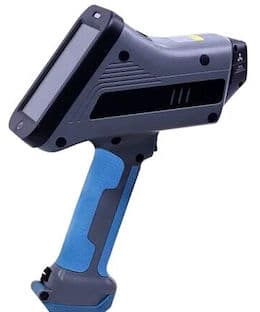
-----
Best and Easiest way to refine gold dust to get 99.9% purity
< Prev. page (You're on the last page of the thread)
Q. This is my first appearance on the site. I'm a hobbyist-artist interested mostly in painting Tibetan thangkas (age old traditional Buddhist scroll paintings). Since very early, painters have used gold dust in painting these thangkas. To make gold dust I dissolve pure gold in aqua regia but, like we all know, we get brown gold dust after precipitation. My objective is not to obtain the solid glittering piece of gold that we get after heating high to the dust, but to get the gold dust that has ink-like flow when painting, for which I still grind the gold dust in the mortar with pestle. But my problem is how to get back that natural gold luster to the brown gold dust so that I get the lustrous golden ink-flow painting?
My sincere regards,
- Patan, Bagmati, Nepal
July 5, 2015
A. Simplest solution - try Kremer Pigments Inc company; they sell gold powder .... or try to make gold powder by DIY method. Take gold leaf and water mixed with honey and rub it on some hard surface (unglazed porcelain plate). That powder can be used as pigment.
Hope it helps and good luck!
- Zagreb,Croatia
A. Gold bad color. Might try washing in water with a little ammonia. Really brightens my gold. Also consolidates it.
ron bragg- ANGLETON Texas USA
ACRONYMS:
AP = Acid-peroxide (HCl + H2O2)
Q. What purity can one expect using AP on E-Waste? Seems it would be safer and less expensive than Nitric Acid, but what is the purity trade off? Just Curious. Thanks.
Richard SpencerRetired - Columbus, Indiana USA
July 7, 2015
INQUARTATION:
The addition of silver to a gold-silver alloy in order to facilitate the parting of the gold by nitric acid.
Q. Sir
Kindly let me know for the INQUARTATION TREATMENT PROCESS
What should be the gold content in the alloy of only gold and silver.
GOLD CONTENT MAXIMUM
SILVER CONTENT MAXIMUM
Thanks,
Vinay
- Mumbai Maharashtra India
July 16, 2015
A. Hi,
Inquartation means Quarter.
If I have 100 gm 18k gold, it contains (18/23.88)% = 75.37 pure 24k gold and 100-75.37 = 24.63 gm other alloy.
Now you have make it 6k by adding other base metal like impure copper or impure silver.
Inquatz means 75.37 * 3 = 226.11-24.63 = 201.48 gm of base metal added for making grains and do the refining using nitric acid.
226.11+75.37 = 301.48.
(75.37/301.48)% = 25 means 6/24 % =25.
cac admixtures - Mumbai, India
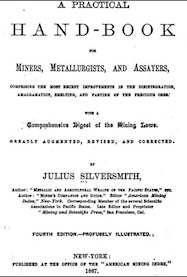
Q. For any who has not read it, a book by Julius Silversmith, written in 1867, would be of considerable interest to anyone interested in gold/silver, etc. Downloadable on Google books .
I have been prospecting Au placer deposits, here in the gold country, Nevada County, California.
This winter thus far has produced a great number of very hard pounding and extended rain storms, unlike any I have seen in all the winters I can recall in my 46 yrs of life.
The result of this unusual weather has been an incredibly large movement of sands and gravel and ancient riverbed containing Au deposits, from the estimated 146 million cubic yards of untouched Au/gravel deposits here, as I never before could imagine.
Thus (although gold not visible with the naked eye in all of it) I have been able to recover hundreds of lbs of ancient riverbed washed out by the enormous amount of high currents from the abnormally hard and extended watershed.
Some of this ancient river bed has gold flake visibly embedded and visible throughout it.
To the chase:
I'm seeking an easier process, other than using a hammer to smash the ancient riverbed into pieces and then using a gold pan to pan the crushed riverbed to recover the gold.
Also the process of recovering the enormous amount of gold dust and particles from the water I have been using to pan the crushed up gold out of the ancient riverbed.
It looks as if there is as much visible gold particles in the water after I break the pieces of ancient riverbed up and pan the gold out as there is at the bottom of my gold pan, and I believe I am losing it all thus far.
Another prospector and I spoke and he said, the oceans of the world have a content of 30% gold, but it remains unrecovered due to the lack of a economical process to recover the gold in them.
I'm needing to process and recover the gold from a few gallons of water that has particles and dust in the water that I have used to pan the gold from the ancient riverbed with.
For those who just got the new idea of northern California gold prospecting:
This was and is not a good idea. Disregard this new idea you have formed as imaginary, pure fantasy and complete craziness.
A prospector's life here is freezing cold, rough and rugged, bleeding busted open old scars and skinned up broken cold toes and hands, elbows, knees; broke and broken up, backache, leg limping, soaking wet and freezing cold hungry, and alone, in the middle of these unforgiving rugged freezing mountains.
Basic survival is a full time 24/7 job everyday and there is in no way any guarantee that one won't die frozen, starving and alone, unknown and unfound, or drowned up here in these rugged mountains of northern California from something as trivial as a sprained ankle, or small as a broken bootlace.
Saying this and needless to say more, all and any operational help will greatly be appreciated.
- Grass Valley, California, U.S.A.
February 15, 2016
A. I try not to use Aqua regia on gold anymore because when I use the Aqua regia I notice a lot of the gold disappears. I think some gold is lost through vapour. Maybe you should try to collect the vapours from the aqua regia. If you melt gold in a blast furnace the wrong way it could vapourize on you if you get it too hot. I don't use mercury anymore but the Old prospectors would roast the gold ore, then they would coat a copper trough with mercury by diluting nitric acid with clean water I think half water and half nitric acid. They would pour mercury into a sock, dip it in the nitric acid water sol'n, then coat the copper trough with mercury. After the copper trough was coated they would mix the ore with water and pour the mud down the copper coated trough. It worked better than a sluice box. The Mercury attracts the Gold like a magnet. Thank you Sierra Nevada for your comment.
Robert FritcheyMr. - Denver, Colorado (Denver County)
Q. Stripping circuit boards, pins, fingers using mp. Set up a shop and use gallons of mp and pounds of material. Yield is incredible. Flush and filter with water to correct pH. Not one thing not going according to plan except when melted in a kiln I get dust or nothing at all. Have used borax and no borax. What gives?
ron bragg- ANGLETON Texas usa
May 29, 2016
Q. We are running business of providing Gold Testing Report.
This is a new business for us and I would like to clarify about Refining in this thread.
Some customers come in with a gold piece for testing and they say this is for Refining. This is where we are confused.
He gave 18K which contains PPT of 783.4. This is the result of what our Testing Machine gave as an average after several testings made.
However the customer was unhappy with the results and stated that they did not get the exact results after refining. Then they tested the same gold piece from another Testing Center which resulted with PPT of 777.6.
We are pretty much sure that the other Testing center has made a calculation and reduced the test results from what their machine actually displayed.
Here I would like to know, if there is any specific calculation we need to make for any gold that is for refining? If so, what is the exact calculation?
We do not want to miss our customers and currently some of them are unhappy, stating that they are losing several grams of money after refining and requesting us for the correct results for Refining.
Please help us on this...
Gold Testing - Colombo, Sri Lanka
July 4, 2016
Q. I am looking to turn 24kt gold into gold powder to use as painting color to use in thanka (tibetan) painting. Is AR the best method to convert solid gold into fine gold powder(precipitate) will this result in 999.9 grade gold powder?? Is it possible to bind this powder for storage and dissolve this again into paint? And can this powder used as gold paint?
Price dk- Kathmandu,Bagmati,Nepal
November 23, 2016
Q. Driving me crazy but I'm not quitting till I get it correct.
Hello. I have a problem and I think y'all can help. When I take my scrap gold out of the crucible it has a copper color and I don't know how to fix it. Could you help me please ?
Joel Stegner- Leechburg Pennsylvania United States
January 16, 2017
A. Hi Joel. I'm not a gold refiner but I've read that the Conquistadors had a similar problem when they melted the Mexican gold they had looted. It turned out to be a mostly copper alloy which had been 'surface enriched' to dissolve away the copper and leave a gold surface :-)
If you've simply melted some scrap, it was probably predominantly copper with a very thin plating of gold on it (millionths of an inch thick). If that was the case, why would you feel that the contents of your crucible would be gold rather than copper? Please weigh it and measure its volume, thus telling us its density -- from that we can probably tell you if your metal is mostly copper or mostly gold. Good luck.
Regards,

Ted Mooney, P.E. RET
Striving to live Aloha
finishing.com - Pine Beach, New Jersey
Ted is available for instant help
or longer-term assistance.
Q. Sir,
If scrap gold has iron any problem for Purity and Recovery?
- tamilnadu, India
September 30, 2017
A. Raja,
It depends on the chemical used to dissolve the gold. With cyanide, you will probably have no problems. With acid, you should dissolve all the iron also. Otherwise, the dissolved gold can re-solidify (cement; immerse) back onto the undissolved iron. If possible, manually remove the iron before dissolving the gold.
- Benton, Arkansas, USA
Q. Hey guys, I need a chemical name a 3rd grader can read. Not all these chemical codes to demonstrate your complexity and knowledge. This may be my last time but every response here is extremely frustrating or YOU'RE DOING IT ON PURPOSE!
I'm a med graduate and a financial advisor. I can break it down simple or completed. All I'm asking for is simplicity!
1) give me the name or sales or chemical one. Is it a powder or liquid? What color is the product? Where can I buy it on a local level. Pool store. Home Depot. Where?
2) How long does it take the gold to melt? Do I place them in a certain order?
3) Does glass matter? Can I use an iron pan! ?
4) What color will it change.
Also I very familiar with all the safety precautions. I just need to know can someone help me.
New hobby - Riverside California
January 2, 2018
![]() Hi Mark, I sympathize! As a med school graduate can you tell me the shape & color of the appendix, and what store sells those scapular blade thingies I need?
Hi Mark, I sympathize! As a med school graduate can you tell me the shape & color of the appendix, and what store sells those scapular blade thingies I need?
Seriously, we may wish that purifying gold was simple and do-able with hardware store chemicals and supplies, but that doesn't make it so. Please explain what you're trying to do. Good luck.
Regards,

Ted Mooney, P.E. RET
Striving to live Aloha
finishing.com - Pine Beach, New Jersey
Ted is available for instant help
or longer-term assistance.
A. Mark,
Dissolving gold isn't a trivial thing. Here's some light reading for you.
Note that this isn't really stuff you want to be messing around with in your garage. A properly outfitted chemistry lab is recommended.
As Ted asked, what exactly is your end goal here?
You even keep saying "melt", which is a totally different thing. If you want to MELT gold, you just need to heat it to 1948 °F inside of a container that itself will not melt at that temperature.

Ray Kremer
Stellar Solutions, Inc.
McHenry, Illinois

A. Gold can be dissolved in muriatic acid (hardware store) and hydrogen peroxide or, a combination of muriatic acid and laundry bleach (sodium hypochlorite)
⇦ bleach/sodium hypochlorite in bulk on
eBay
or
Amazon [affil link]
. Muriatic acid is about 30.5% hydrochloric acid. Both solutions produce toxic fumes that will surely rust any steel present in the immediate area. Must use these solutions upwind outside, away from neighbors and cars, or in a fume hood inside that exhausts to the outside. These are probably the least hazardous chemicals that are commonly used to dissolve gold.
The other choices are the very dangerous aqua regia, usually used hot, or the extremely poisonous sodium (or potassium) cyanide plus an oxidizer like hydrogen peroxide. Also, the expensive combination of potassium iodide plus iodine or potassium bromide plus bromine will dissolve gold.
The only thing I've mentioned that will effectively dissolve bulky pieces of gold is the aqua regia (hot) that Ray just provided the link for. Everything else I mentioned would only be practical for very thin gold, like 30 millionths of an inch thick gold plating or gold powder. For bulk gold, these other chemicals might take weeks or they may not completely dissolve the gold in your lifetime.
And, like Ray said, you MELT with heat and DISSOLVE with chemicals.
- Benton, Arkansas, USA
Q. Most of the processes described are for gold bound to plastic using another metal/ alloy.
I have gold coated on plastic sheets by a physical process called sputtering. Is it possible to physically strip the gold layer using some chemicals?
- Redwood, California
March 20, 2018
![]() Hi Arthur. All things are possible, but when it comes to recycling/recovery the question is usually what is economically feasible & practical (because chemicals and waste disposal can cost more that the value of the recovered gold) ... so the first thing we must almost always ask you is: "How thick is this gold?". Also, what are these "sheets" if you know? Mylar?
Hi Arthur. All things are possible, but when it comes to recycling/recovery the question is usually what is economically feasible & practical (because chemicals and waste disposal can cost more that the value of the recovered gold) ... so the first thing we must almost always ask you is: "How thick is this gold?". Also, what are these "sheets" if you know? Mylar?
It's unfortunate that you're in Redwood, Arthur, as it's unlikely to be friendly towards such chemical operations.
Regards,

Ted Mooney, P.E. RET
Striving to live Aloha
finishing.com - Pine Beach, New Jersey
Ted is available for instant help
or longer-term assistance.
Dear Ted,
I am currently in Mumbai for work and posting the message from here.
The plastic sheet is polyethylene, and gold is deposited using the process of sputtering - a fine layer.
I am looking for a process of recovery, that is all.
I know it will not be commercially or economically viable, but I am only looking for some way that I haven't read elsewhere. This is not a mining operation, you see!
-Arthur. :)
- Redwood, California.
A. Hi Arthur. My point about Bombay vs. Redwood is that every major environmental organization rails against amateur recovery of gold from waste, usually showing street waifs in Mumbai in their videos; whereas Californians will try their best to impede you. So if I were you I'd do it while in Mumbai, not wait until you get back to Redwood.
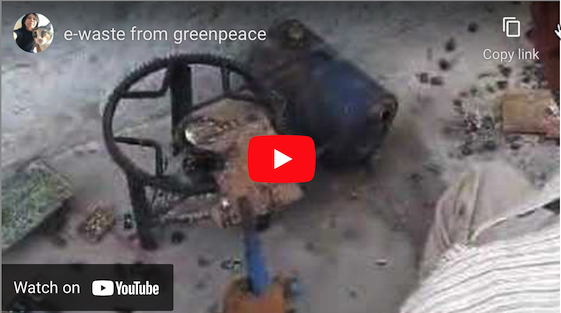
Polyethylene is very acid resistant and it would not surprise me if it could withstand aqua regia or aqua regia substitutes, allowing direct dissolution of the gold with no need for any fancy approach which you haven't already read about.
But burning the poly is perhaps one possible route to recovery, although people will be unhappy with that. There have been developments with bacteria that will consume polyethylene, and there has reportedly been some development work towards converting polyethylene back into oil.
Again, though, the first question which simply must be answered is "How thick is the gold?". 'A fine layer' is not quantitative enough, not only because you can't know the viability, but also because you can't properly run the process, knowing how much chemical to add and how much gold or intermediate product to expect at each step until you can answer that question. There is gold everywhere, even in seawater. But if you don't know how much you can't track it; and if you can't track it you can't process it in practical fashion. Good luck.
Regards,

Ted Mooney, P.E. RET
Striving to live Aloha
finishing.com - Pine Beach, New Jersey
Ted is available for instant help
or longer-term assistance.
A. I think the question is basically about the best and easiest way of taking out thin films of gold from the surface of plastic sheets. Economics, pollution, etc. are of course important which cannot be avoided in a practical situation.
I wonder if one can use some kind of a solvent - alcohol, acetone
⇦ on
eBay
or
Amazon
[affil link] Flammable!
, TCE, etc. to delaminate the gold layer from the plastic substrate which dissolves in the solvent.
India is a vast country where different levels of economies and technologies coexist. I know of a company in Bangalore by name E-Parisara which treats e-waste in a scientific and environmentally safe manner. It is run by a qualified electrochemist who also runs electroplating and PVD coating systems. He mines all the gold required for decorative PVD from electronic waste. But gold is not the only precious metal he recovers.
Bangalore Plasmatek - Bangalore Karnataka India
![]() Thanks, Prabhakara. I have never had the pleasure of visiting your fascinating country, but from running this website for 23 years I've learned of its incredible diversity. On the one hand we get inquiries from remote villagers who believe old lightning rods have the ability to release stored lightning power on command if magic words are spoken, while on the other hand we often receive insightful commnications from people with far deeper technical knowledge than I'll ever achieve :-)
Thanks, Prabhakara. I have never had the pleasure of visiting your fascinating country, but from running this website for 23 years I've learned of its incredible diversity. On the one hand we get inquiries from remote villagers who believe old lightning rods have the ability to release stored lightning power on command if magic words are spoken, while on the other hand we often receive insightful commnications from people with far deeper technical knowledge than I'll ever achieve :-)
Regards,

Ted Mooney, P.E. RET
Striving to live Aloha
finishing.com - Pine Beach, New Jersey
Ted is available for instant help
or longer-term assistance.
Karat refining with copper inquartation
Q. My situation: what if I use copper with 9 & 10 karat gold scrap for inquartation and then further with AR process to get pure out.
Please let me know the complete process; I use hydrazine hydrate to precipitate.
What purity will I achieve? Will I have any copper traces?
- Mumbai, INDIA
July 2, 2018
Q. I would like to have enlightenment about this process with the target of getting high purity of gold while buying it from a artisanal gold trader:
Suppose you buy a piece of already melted gold and you want to be sure you don't have scrap or a lower grade of gold and you decide to treat it again; could someone melt it again using a borax flux to remove the impurities and other metals mixed with the gold?
Can someone melt again with the borax flux and pour the melted gold into a bowl with nitric acid to cleanse it and reduce other metals such as silver or copper if melted before with the gold and wash it later with distilled water?
- Nigeria
July 16, 2018
A. Pouring molten gold into nitric acid would be EXTREMELY DANGEROUS and unlikely to achieve anything useful.
For someone with little or no knowledge of chemistry, by far the best process is fire assay. It requires little equipment, produces high purity gold and has been practiced for hundreds of years.
Here is a good guide:

Geoff Smith
Hampshire, England
A. None of your ideas will work, at all. There's no simple way to purify gold in a melt. Borax will do nothing but act as a flux. You could remove some of the copper using Borax and an oxidizing agent, such as sodium or potassium nitrate, but that reaction will quickly destroy crucibles and it won't remove the silver.
Like Geoff said, the quenching of molten gold in nitric acid is a terrible idea. Besides being extremely dangerous, it wouldn't work.
As Geoff said, fire assay is the very best and most reliable way.
You might be able to develop some sort of accuracy with a touchstone, if you could come up with standard alloys to compare with.
Specific gravity measurements could possibly be used, but, of you don't do it right, you can introduce error. This would be my last choice.
You could melt it together, drill several holes, and refine maybe a 10g sample of the drillings with aqua regia, but you would need some experience for that.
- Benton, Arkansas, USA
Gold testing and refining
Q. My situation: So I am new at this gold refining and recovery but can pick it up fast. So I have been buying gold nuggets and flakes for fun and melting them down into a bar. I bought a test kit so I could test everything I buy to know if it is real. So far I have a bar that is about 24 grams. So when I do the acid test with it on the testing stone the 10k, 14k, and the 18k don't dissolve it but the 22k acid does. And I tested the bar itself and the spot I put the acid in turned dark. It didn't bubble or fizzle or act funny it just slowly turned dark but it only did that with the 22k acid. The other acids didn't do anything to the bar. Why is that. And my next question is the more I melt my bar down does it make it more pure?
Randy McaroyHobbyist - Bethany, Oklahoma, Usa
July 24, 2018
A. The touchstone test is a comparative test. You can buy a set of gold "keys" that are tipped with various karat golds. You use these to make side by side streaks with a streak of the gold you are testing. Then, you apply one of the acids and watch what happens. The object is to find a streak of known gold content that has the same rate of attack and color change as the unknown sample you're testing.
The acids, themselves, tell you nothing. Whether or not a drop of a certain karat acid dissolves your gold is meaningless. The higher the karat number of the acid, the stronger the acid. If you put a 22K acid on a streak of 10K gold, it would dissolve so fast, you wouldn't be able to see the progressive dissolving that would take place with a weaker acid. You, therefore, can best see the changes that take place, on 10K gold, by using the weaker 10K acid. Same thing with the other karat golds. The 14K acids work at the best speed with 14K gold, etc.
Most jewelers that use a touchstone are experienced enough in testing the same, fairly consistent, karat alloys, day after day, that they can sort various karats by using only the various acids and watching how fast the streaks are attacked and by observing the resulting color.
The touchstone methods is designed for karat golds. Yellow karat gold contain silver, copper, and a little zinc, of fairly consistent amounts, depending on the karat and the color. If any other metals are present in the alloy, or, if the silver content is higher than about 10%, it can alter the rate of the attack of the acids and give false answers.
Although placer gold always contains silver and copper, it also contains other metals and some placer has a lot of silver in it. These can alter the rate of acid attack considerably. Therefore, any results on placer nuggets using a touchstone are iffy, at best.
If you really want to know what the gold content really is, send about a 1/2 gram sample of drillings to a lab that does fire assaying. It will cost about $50-$100. Also, many jewelers, especially those that buy a lot of scrap gold, now have XRF (x-ray) guns that can tell you the various percentages of all the metals, in about a minute. These XRF guns are somewhat operator dependent, though, and some readings can be faulty, especially if the operator is inexperienced. Most would probably test your gold for free and, if possible, you should back that reading up with an XRF reading from a second jeweler, or gold buyer. Get a second opinion.
Re. your second question: No, you can't purify gold in a melt. The copper and some of the other impurities can be reduced by adding certain chemicals, but these are corrosive to the crucible and you'll never remove any of the always present silver that's in placer gold. By repeated melts, the copper can decrease by a very small amount, just by the reaction of the copper on the surface with the oxygen in the air. The resulting copper oxide is transferred to the slag. But, for repeated melts as a purification process, the answer is an emphatic NO.
Hope this helps.
- Benton, Arkansas, USA
A. Hi randy,
Your 10,14 or 18 carat gold contains alloy; it has silver in an alloy. If the ratio of composition of silver from alloy to pure gold mismatch, thEn masking of greyish blackish silver chloride coating occurs on metal surface in AR treatment. That is called 'masking'. It dissolves in ammonium hydroxide but returns when metal comes in contact with AR.
CAC admixtures - Mumbai, India
⇦ Tip: Readers want to learn from your situation;
so some readers skip abstract questions.
Q. How to kill iridium in gold with 99.99% silver and HNO3 (NITRIC ACID)?
vasu rastogihobbyist - india
September 18, 2018
Q. Hi everyone,
Thank you all for your wonderful responses. Recently I got to know about gold extraction from computer scrap, and I purchased a little stuff to have some fun and add a little knowledge. I took around 90 pentium 4 cpu's and dipped in solution of HCl and Nitric acid. I found no reaction occurs so I added a little sulfuric acid to it. Fumes started and after some time gold pins and gold plating left in that solution. Now I'm worried to know what should be my next best step to get complete process. If anyone wants to add in it, I would be very thankful to it.
Thanks & regards
Syed
HARDWARE - Aligarh, UP, INDIA
Q. Aslm Alkm,
Hi there Urban miners; I'm here to have more enlightenment ...
1. which is the most proper Acid qualitative to use when extracting Gold, i.e., Concentrated or Dilute Acid?
2. is there anyone here who can help tell and explain the composition of this GOLD STRIPPER? I saw its action on Ceramic Processor; it is unlike Aqua Regia, it is so selective that it does not dissolve other metals.
I found it difficult to get it here in Nigeria, that is why I think if I can see the composition I might be able to make it myself,
Thanks.
- Lafia nasarawa Nigeria
April 14, 2019
Q. I am doing aqua process to recover pure gold from 9, 10, 14 karat alloys. I am precipitating using hydrazine hydrate, getting the sponge and melting it, but in XRF and fire assay show that I'm getting fineness up to 0.995-0.996 and other parts are showing as silver. I want consistent fineness of 0.998+. Is there any silver chlorides remaining in the sponge or anything else? I want 0.998+, in my sponge I have chloride, how to remove that.
Armaan Joshi- Mumbai, Maharashtra, India
May 29, 2019
A. Hi araman,
You precipitate gold using hydrazine hydrate, but you have not washed the gold sponge properly .
Thanks
CAC admixtures - Mumbai, India
Refined Gold has Iridium in it
Q. Actually after refining gold from dust, purity was okay and there were no more metals shown in the xrf report; but after casting pieces then filling done, then setting also done. But in polishing, Blackspots shown in the ring and those spots are Iridium. How it came inside? Can you suggest?
Or else is there any procedure to remove iridium from gold ppt? Please let me know I am facing problems due to this iridium.
HKE pvt ltd - mumbai Maharashtra India
June 4, 2019
A. Hi Wasim. I know nothing of gold refining, but I do see it reported on thread 15854 that, because the value of iridium is far lower than gold and nitric acid does not dissolve iridium, scammers in India are diluting their gold with iridium to fool buyers about its purity. You might want to research the possibility that this report is true.
Regards,

Ted Mooney, P.E. RET
Striving to live Aloha
finishing.com - Pine Beach, New Jersey
Ted is available for instant help
or longer-term assistance.
Hi Wasim,
1) Is your alloy contains iridium then check its %
2) And if no iridium present then change your polish buffing wheel which you're taking as a dust for gold refining.
3) Check your refining process -- any contamination or any process changed.
4) After casting, when you take casting scrap in refining process.
CAC admixtures - Mumbai, India
Q. Hey you guys, I am not as smart as you guys but I uncovered a good bit of gold dust and I'm seeing some flakes. Dropped nitrite acid on the stuff for confirmation. Checks out. Separation process I have no guidance. A lot of it is in clay it was washed into. Help.
Bryan m [surname deleted for privacy by Editor]- Winder Georgia United states
August 13, 2019
Q. Hey guys I've recently struck gold the improbable does sometime happen. So I've been reading you guys comments -- most informative. I've discovered a large deposit of flakes, dust and fine gold thus far. I've been in need of direction. I'll include pics with this post but I am trying to keep it somewhat quiet. I bought the acid kit: positive for gold, then I gave a sample to a friend of mine who has a machine and said 22k so I went and got all I could. My family aren't really taking me seriously. I had a time at first separating it from the dirt so then I had a thought: I thought if taking the dirt away from the gold is not possible why not take the gold away from the dirt. I now have two pounds of clean gold flakes. Yes. I'm taking it to an assayer Monday. You guys would not believe. On a good guess I bet I've poured out 5 pounds on the ground just trying to clean it. But I think I've learned; now any guidance from you guys is most appreciated. bryan
Ed. note: This RFQ is outdated, but technical replies are welcome, and readers are encouraged to post their own RFQs. But no public commercial suggestions please ( huh? why?).
m [returning]
- Atlanta Georgia
August 18, 2019
A. Hello Bryan,
Well, if your friend's "machine" proves it is 22 kt gold, let's hope the professional assayer's results are the same. Since you have clean flakes and know you have 2 lbs, there are 14.58 troy oz in a pound. If the assayer says you have 22 kt gold, then it's .9166% pure (22÷24). Get a copy of the assay analysis report with the business name and phone # in the heading of the report. You can then take it to a reputable refiner to have it melted into a bar or sell it to them outright. Get a certified check of course. Being you went to the assayer already, let us know how you made out. I'm also curious what state you found this in.
Electronic Plating - Winston Salem, North Carolina USA
Q. Hello guys, I'm Wayne a metallurgist from Zimbabwe specializing in refining precious metals. Currently I am working on refining PGMs using aqua regia but having problems de-nox-ifying the solution. I used urea but it's not reacting, are there any alternatives?
Wayne Chinyama- Harare Zimbabwe
September 15, 2020
Q. After using acid and bleach ⇦ bleach/sodium hypochlorite in bulk on eBay or Amazon [affil link] to collect the gold I get this grey slime in with the gold I have tried vinegar ⇦in bulk on eBay or Amazon [affil link] , comet, even a mild acid cleaner. It helps but not the answer.
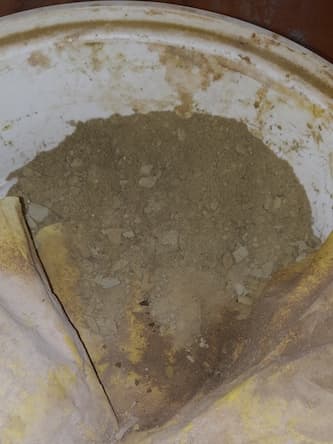
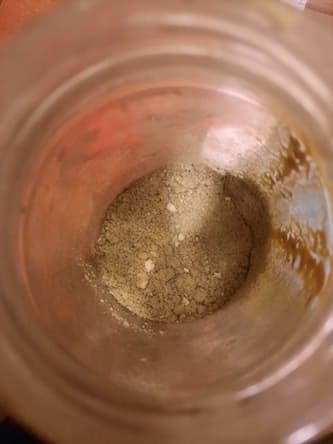
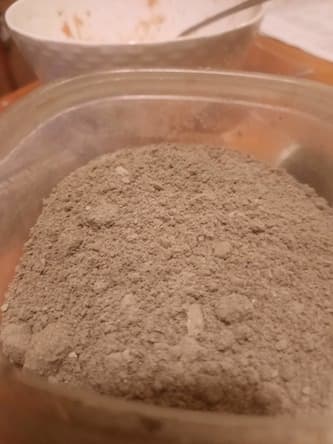
What am I missing or not doing right in my process?
Robert Burroughs- Mervin Saskatchewan, Canada
July 9, 2021
A. Hi,
as from the images it seems like a cement silver, maybe your gold masked within the cement silver powder? thanks.
refining consultant - mumbai india,
Q. What is this heavy dust at the bottom of my pan that looks a lot like the pics below but have had no luck melting it. The source has been from some great looking rocks that seem to be abundant in my area. I literally have a pile of this heavy metal dust that I can't melt using oxy-acetylene and borax. You can't even look at the flame it's like a welder there's no way it's not hot enough to melt gold, so what gives? What is this stuff? I'm sure it melts at some point but not with my current capabilities. I have melted gold this way before so any idea?
Mark Sw
Self proclaimed genius - Phoenix, Arizona
April 21, 2022
Q. Gold from granite rock. Problems melting with propane torch. Why?
Digger D. -- Chris Dyke
- Gastonia, North Carolina
December 1, 2022
Q, A, or Comment on THIS thread -or- Start a NEW Thread

